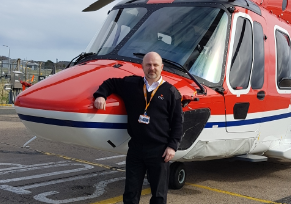
The deadly Covid-19 outbreak has brought about a “complete one-eighty” for North Sea helicopter operators and changed the lives of pilots — as well as their families.
Steve Jones, chief pilot at CHC, described the situation as “very dynamic”, with “constant” updates coming through from health and aviation authorities.
Mr Jones’ working hours skyrocketed as he tried to get his head around the various directives and their implications for his team of 70 aircrew.
Helicopter pilots are the bus – or taxi drivers – of the North Sea. If they down tools, the whole show stops pretty quickly.
And so, Mr Jones needs to be in work, or at least on the end of a phone, to answer people’s questions.
It’s fair to say Mr Jones has learned to roll with the punches since moving to the north-east in 2014, after 26 years in the military, which included a spell serving in Afghanistan.
The downturn had just kicked in and he didn’t even get to start his new job. He worked for the air ambulance service for a period, before securing a job at CHC two years ago.
Now he’s got to contend with the Covid-19 outbreak, which hasn’t left his family life untouched.
“My wife had to close her business, but she’s keeping busy,” he said. “Coronavirus has changed everyone’s life. We do not go out as often. Where we live near Turriff is quite rural, so we can walk around the land where we live. I tend to travel in uniform a lot more than I used to so that I don’t get pulled over by the police on the way to work.”
Recalling the first few days after it became clear that Covid-19 was going to impact North Sea workers, Mr Jones said: “There were lots of questions. Right from the start it was really busy. It was go, go, go. We put in a lot of time.
“It has been a complete one-eighty from what we do normally. It wasn’t this busy in the military in Afghanistan.”
Mr Jones said CHC had gone from being in a position where it had no issues filling its aircraft to one where it is reducing passenger numbers for social distancing purposes.
Passengers are having their temperatures taken before they enter the heliport in Dyce.
Hand sanitiser, labels and signs are “everywhere” and distancing is being enforced at check in and security.
CHC has also adapted a helicopter – dubbed a “corona copter” by industry – to ferry suspected Covid-19 sufferers back to shore for treatment, as have other operators.
The company can use the other aircraft in its fleet to transport suspected cases, but only with sufficient spacing between crew and passengers, with a “deep clean” carried out before the copter can return to normal duties.
All the same, workers have taken to social media to raise concerns about social distancing in heliports and on board copters used by the oil industry.
Mr Jones said: “None of us has experienced this before. We are learning as we go along, with safety in mind.
“We’ve taken Health Protection Scotland’s advice and been over-cautious in how we’ve applied it. We’ve gone one step higher. For example, if they say ‘there’s no infection, you can bring everyone back’, we’ve said ‘no we would rather bring fewer people back’.
“We’re working hard to provide a service. Our pilots want to do the job and get sick people back to start the recovery process.”
At the time of speaking, he said the procedures CHC has put in place appear to have protected its crew.
Mr Jones said: “We’ve done very well so far. Hopefully the procedures we’ve got in place are helping towards that.
“We feel like we are getting there. There are days when things are going really well. There are other days when we have a few queries and we take them back with us.
“I would like to think we’ve got ourselves a little bit more aligned and things are a bit calmer. There are fewer queries and we are on a nice line now.”
